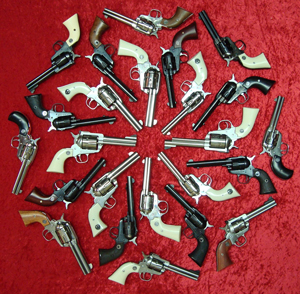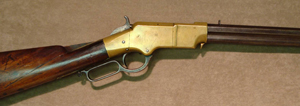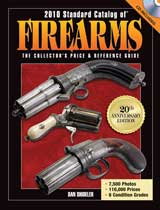 This Special Order Winchester Model 1886 sold for $11,000. |
James D. Julia was nervous. It was October 2008 and the firearms auctioneer from Fairfield, Maine, was listening to news reports warning of a possible collapse in world financial markets. Earlier that year, in March, his firearms auction business enjoyed a $12.7 million gross for a single auction, the largest ever, anywhere.
Now, it seemed like the financial world was unraveling and he was about to open another firearms auction. Julia feared that buyers wouldn’t be buying and the auction wouldn’t be successful. “Nobody knew it, but I was sweating bullets,” he says. Well known for their high quality firearms auctions, the James D. Julia Auctioneers started the October 2008 auction featuring a rare Colt Walker pistol with an estimated selling price between $500,000 and $1,000,000. Julia wondered how it would it fare in an economy that seemed to be on the brink of disaster. It sold for $920,000, setting a world record for the most expensive single firearm sold at auction.
Over the 40 years that Julia has been in the auction business, he’s sold over $130 million worth of firearms and military goods. In the past five years his auction company has averaged $15,000 per lot sold—six to eight times the industry average. The day after the record Colt Walker sale, the stock market lost 10 percent of its value. In general, economic times are indeed difficult— “it’s about as challenging a time you could ask for in recent years,” he says—but points to one simple reason for success: “There’s always a bunch of guys who will fight for a special item; they are passionate in their interest and desire. A true collector is not an investor in his things; they love and understand those things; that’s what drives them.”
 |
Manufacturers of modern firearms, especially AR-15 rifles and concealable handguns—have also enjoyed record sales over the last couple of years. Julia, however, says sales in the firearms industry has nothing to do with the success of the auction industry. “Thank God for the fear mongers who purchased Glocks and such,” he says, “but it’s a totally different guy who buys collector pieces from gun auctions.”
Despite the declining economy, Scott Weber, owner of Gunrunner Online Firearms Auctions in Burton, Ohio, also saw significant success in his firearms auction business last year but sees a closer connection between the political climate, general firearms sales, and sales from firearms auctions. Weber says 2009 was Gunrunner’s highest grossing year of their 10 years of auctioneering, “and we thank Mr. Obama for that!” Gunrunner sells 5,000 guns a year in online auctions and Weber says they’re on their way to doubling the revenue of 2009. “No recession here!”
In 2009, Kramer Sales, a firearms auctioneer based in Prairie du Chien, Wisc., sold around 1,500 antique and modern firearms. Owner Curt Kramer says that while they’re a smaller outfit, this is about double what they did in 2008. “We sold some really interesting firearms at auction this past year, from a .50 caliber WWII British Boyes anti-tank rifle to some great deluxe Winchesters, a Henry Rifle, and just about everything in between.”
By contrast, James D. Julia Auctioneers will sell around 800 guns generating from $8.5 million to $13 million. According to Julia, his nearest competitor will sell 3,800 guns to generate about $3 million and conduct 20 to 30 auctions a year. Julia conducts nine auctions a year. “We don’t aim for quantity but quality,” he says.
Whether passionate collectors or political concerns are driving the firearms auction industry, the success has brought its share of surprises to the auctioneers.
“Our staff was not ready for the amount of firearms streaming into the store,” says Weber. He says the Gunrunner employees in one load picked up over 1,000 guns and recently received another collection of 500 handguns. “All day long the guns come in the mail or by truckload—it’s like Christmas every day!” Weber says this level of business requires Gunrunner employees to work until 11 p.m. every night just processing the paperwork for the firearms. “It’s great fun,” he says, “but I am working seven days a week.”
The surprising demand for firearms has also brought a demand for ammunition. “Ammo sales has been nuts for two years,” says Kramer, particularly of ammunition in not new but not old enough or in good enough condition to be collectible. “It’s just good shooter ammo,” he says. “Further, ammo prices in the retail stores have not dropped and my buyers realize it.”
Despite the record-setting sales and its position as one of the larger firearms auction companies, Julia considered the economic downtown and prepared for the worst. “I knew a recession was coming but I didn’t know when,” he says. “Just as soon as it happened I met with my staff and told them what to expect. First I told them that we’re not going to fire anyone; instead we’re going to do more for our client. So we implemented a policy change. If the goods to sell are expensive, we’ll sell at a zero percent commission. I called it the James D. Julia ‘Stimulus Plan.’
 Another unique piece from a recent Kramer auction: a Civil War era Henry manufactured in 1864. |
The key was to generate an attitude not of restriction but of more service to the customer. The goals were simple: We would get more stuff to sell, get more people in the door (at 0 percent), and make life hell for our competition.” As a result, Julia says last year his company sold a lot less than the $42 million in stuff they were supposed to sell; but they are now constantly negotiating with new clients.
According to Julia, when the market drops, it just gets tougher to sell but also to get the goods to sell. “Sellers are either people who have things that have to be sold—they’re just done with their stuff—or they’re of the opportunistic group, checking to see what profit they might get out of a sale.” Most opportunistic sellers will wait in bad times, he says.
Weber says Gunrunner’s challenge is getting 350 guns a month onto their auction block with accurate descriptions. “It’s tough to research some of the firearms—we are getting some of the rarest guns in the world into our auction facility— and it takes time to get the descriptions right so that we really know what we have.”
Moreover, the company needs more physical space. In fact, Gunrunner recently purchased more business space near their current location and Weber says they may need more immediately. “We will be doing two types of auctions a month. I’ve got a new crew hired and they’ll start a new 24/7 auction in June,” he says.
Kramer brings up a host of challenges he’s facing: time required to keep up with all of the state laws, managing nationwide shipments, and Internet and phone bidding. He says keeping up with technology keeps him busy and the firearms industry is expanding much faster due to the Internet and Web-savvy buyers who are always looking for a particular gun to upgrade or fill out a collection. “I am a computer-literate guy,” he says, “but we are doing a lot of things with Internet catalogs and live Internet bidding that I never thought I would be doing.”
Julia, Kramer, and Weber all share a favorable outlook for the firearms auctions business. Weber says that 2010 looks to be Gunrunner’s greatest year by far—double the business of last year. “It’s unreal!” he says. Kramer says 2010 has been very good so far: “Our March auction was our best attended sale yet and prices were very strong on all types of firearms.”
According to Julia, the auction business, while good, is not as easy as it has been in the past. The bottom line, however, is there. The industry’s advantages, he says, are the huge pool of goods which are a magnet for buyers and the tremendous pool of financial resources which allow him to spend a lot of money advertising the auctions.
“In great times you draw people in and they fight for things,” says Julia. “In bad times, you set realistic or conservative expectations (prices), and then have something people want. With a declining economy, people are preprogrammed to be more careful when buying and the auction creates the right atmosphere to take advantage of this. Get two bidders who think ‘I’m going to save some money and get what I want’ and they’ll drive the price up.”
Mark Kakkuri is a freelance writer in Oxford, Mich.
This article appeared in the August 2, 2010 issue of Gun Digest the Magazine.
Recommended books for gun collectors:
 Standard Catalog of Firearms, 20th Edition.
Standard Catalog of Firearms, 20th Edition.
The Official Gun Digest Book of Guns & Prices 2010, Rifles, Pistols & Shotguns
5th Edition

![Best Concealed Carry Guns In 2025 [Field Tested] Wilson Combat EDC X9S 1](https://gundigest.com/wp-content/uploads/Wilson-Combat-EDC-X9S-1-324x160.jpg)


![Best 9mm Carbine: Affordable PCCs [Tested] Ruger Carbine Shooting](https://gundigest.com/wp-content/uploads/Ruger-Carbine-Shooting-100x70.jpg)
![Best AR-15: Top Options Available Today [Field Tested] Harrington and Richardson PSA XM177E2 feature](https://gundigest.com/wp-content/uploads/Harrington-and-Richardson-PSA-XM177E2-feature-100x70.jpg)

[…] Read Part I of this article at Gun Digest’s web site. […]